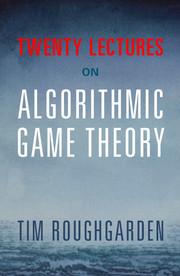Book contents
- Frontmatter
- Dedication
- Contents
- Preface
- 1 Introduction and Examples
- 2 Mechanism Design Basics
- 3 Myerson's Lemma
- 4 Algorithmic Mechanism Design
- 5 Revenue-Maximizing Auctions
- 6 Simple Near-Optimal Auctions
- 7 Multi-Parameter Mechanism Design
- 8 Spectrum Auctions 97
- 9 Mechanism Design with Payment Constraints 113
- 10 Kidney Exchange and Stable Matching
- 11 Selfish Routing and the Price of Anarchy
- 12 Over-Provisioning and Atomic Selfish Routing
- 13 Equilibria: Definitions, Examples, and Existence
- 14 Robust Price-of-Anarchy Bounds in Smooth Games
- 15 Best-Case and Strong Nash Equilibria
- 16 Best-Response Dynamics
- 17 No-Regret Dynamics
- 18 Swap Regret and the Minimax Theorem
- 19 Pure Nash Equilibria and PLS-Completeness
- 20 Mixed Nash Equilibria and PPAD-Completeness
- The Top 10 List
- Hints to Selected Exercises and Problems
- Bibliography
- Index
5 - Revenue-Maximizing Auctions
Published online by Cambridge University Press: 05 August 2016
- Frontmatter
- Dedication
- Contents
- Preface
- 1 Introduction and Examples
- 2 Mechanism Design Basics
- 3 Myerson's Lemma
- 4 Algorithmic Mechanism Design
- 5 Revenue-Maximizing Auctions
- 6 Simple Near-Optimal Auctions
- 7 Multi-Parameter Mechanism Design
- 8 Spectrum Auctions 97
- 9 Mechanism Design with Payment Constraints 113
- 10 Kidney Exchange and Stable Matching
- 11 Selfish Routing and the Price of Anarchy
- 12 Over-Provisioning and Atomic Selfish Routing
- 13 Equilibria: Definitions, Examples, and Existence
- 14 Robust Price-of-Anarchy Bounds in Smooth Games
- 15 Best-Case and Strong Nash Equilibria
- 16 Best-Response Dynamics
- 17 No-Regret Dynamics
- 18 Swap Regret and the Minimax Theorem
- 19 Pure Nash Equilibria and PLS-Completeness
- 20 Mixed Nash Equilibria and PPAD-Completeness
- The Top 10 List
- Hints to Selected Exercises and Problems
- Bibliography
- Index
Summary
Lectures 2-4 focused on the design of mechanisms that maximize, exactly or approximately, the social welfare of the outcome. Revenue is generated in such mechanisms only as a side effect, a necessary evil to incentivize agents to report truthfully their private information. This lecture studies mechanisms that are designed to raise as much revenue as possible, and characterizes the expected revenue-maximizing mechanism with respect to a prior distribution over agents’ valuations.
Section 5.1 explains why reasoning about revenue maximization is harder than welfare maximization, and introduces Bayesian envi-ronments. Section 5.2 is the heart of this lecture, and it characterizes expected revenue-maximizing mechanisms as “virtual welfare maxi-mizers.” Section 5.3 describes how this theory was used to boost sponsored search revenue at Yahoo. Section 5.4 proves a technical lemma needed for the characterization in Section 5.2.
The Challenge of Revenue Maximization
Spoiled by Social Welfare Maximization
There are several reasons to begin the study of mechanism design with the objective of maximizing social welfare. The first reason is that this objective is relevant to many real-world scenarios. For instance, in government auctions (e.g., to sell wireless spectrum; see Lecture 8), the primary objective is welfare maximization. Revenue is also a consideration in such auctions, but it is usually not the first-order objective. Also, in competitive markets, a rule of thumb is that a seller should focus on welfare maximization, since otherwise a competitor will (thereby stealing their customers).
The second reason to start with social welfare maximization is pedagogical: social welfare is special. In every single-parameter environment, there is a DSIC mechanism that, for every profile of private valuations, assuming truthful bids, computes the welfare-maximizing outcome (cf., Exercise 4.1). Such a mechanism optimizes the social welfare as effectively as if all of the private information was known in advance—the DSIC constraint is satisfied for free. This amazingly strong performance guarantee, called an “ex post” guarantee, cannot generally be achieved for other objective functions.
- Type
- Chapter
- Information
- Twenty Lectures on Algorithmic Game Theory , pp. 55 - 73Publisher: Cambridge University PressPrint publication year: 2016



